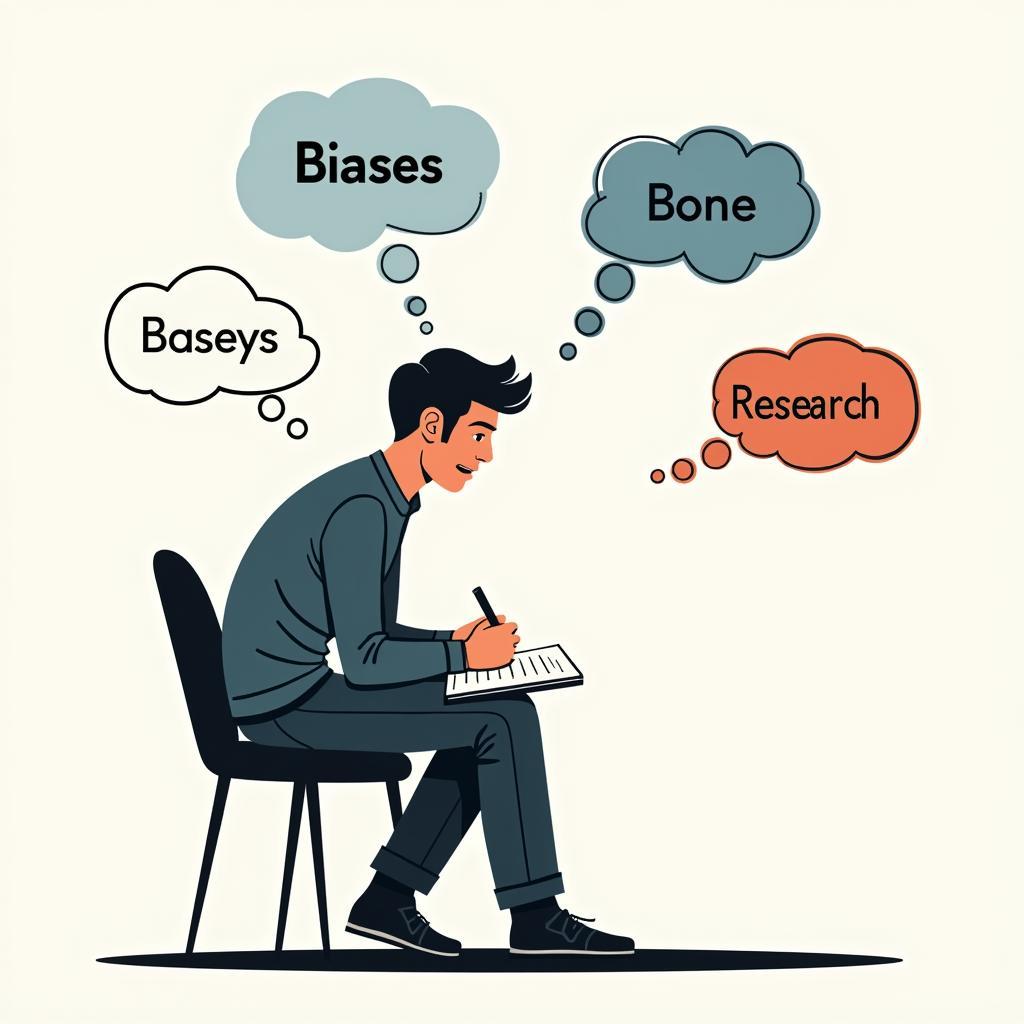Qualitative research delves into the intricate tapestry of human experiences, seeking to understand the “why” behind behaviors, beliefs, and perceptions. It’s a journey of exploration, unveiling rich narratives and uncovering hidden meanings. But within this exploration lies a crucial aspect that often remains unspoken yet profoundly influences the entire research process: reflexivity.
 Reflexivity in Qualitative Research
Reflexivity in Qualitative Research
Unmasking the Subjectivity: What is Reflexivity?
Reflexivity In Qualitative Research is the art of acknowledging and critically examining the researcher’s own role, perspectives, and potential biases throughout the research journey. It’s a continuous process of self-awareness, recognizing that the researcher isn’t a neutral observer but rather an active participant whose background, beliefs, and values inevitably shape the research process.
Imagine a researcher investigating paranormal experiences. Their own belief or skepticism towards the supernatural will undoubtedly influence how they frame interview questions, interpret responses, and ultimately analyze the data. Reflexivity encourages researchers to confront these inherent biases, ensuring a more balanced and nuanced understanding of the phenomenon under investigation.
The Significance of Reflexivity in Shaping Research Outcomes
Why is reflexivity so crucial in qualitative research? Let’s delve into its profound impact:
- Enhancing Research Rigor: Definition of rigour in research is paramount in any research endeavor. By acknowledging personal biases, researchers can implement strategies to mitigate their influence, strengthening the trustworthiness and credibility of their findings.
- Deepening Data Interpretation: Reflexivity allows researchers to move beyond surface-level interpretations and delve into the intricate interplay between their own perspectives and the participants’ lived experiences. It fosters a more nuanced understanding of the data, enriching the research findings.
- Promoting Ethical Research Practices: Reflexivity is inherently intertwined with ethical considerations. By recognizing their potential influence on the research process, researchers are better equipped to engage with participants respectfully, ensuring their voices are heard authentically.
Practical Strategies for Incorporating Reflexivity
Reflexivity isn’t a one-time task but rather an ongoing process woven throughout the research journey. Here are some practical strategies:
- Maintain a Reflexive Journal: Encourage regular reflection by maintaining a dedicated journal. Document personal thoughts, feelings, and any potential biases that arise during the research process.
- Engage in Peer Debriefing: Collaborating with fellow researchers provides an invaluable opportunity to discuss emerging findings and potential biases. Objective perspectives can illuminate blind spots and refine interpretations.
- Embrace Diverse Methodologies: Utilizing a variety of qualitative research and evaluation methods can provide a more comprehensive understanding of the phenomenon being studied. Triangulating data from multiple sources helps mitigate the potential influence of researcher bias.
 Researcher Taking Notes
Researcher Taking Notes
Reflexivity in Action: Unveiling the Paranormal
Let’s consider an example from the realm of paranormal research. Imagine a researcher investigating the phenomenon of haunted houses. They might write in their reflexive journal:
“As I interview residents who claim to have experienced paranormal activity, I’m aware of my own skepticism. I find myself searching for logical explanations for their experiences, potentially overlooking subtle cues or emotional nuances in their narratives.”
This act of acknowledging their skepticism allows the researcher to approach the interviews with greater sensitivity, ensuring they don’t impose their own beliefs on the participants’ experiences.
Navigating the Labyrinth of Subjectivity
Reflexivity in qualitative research is a continuous journey of self-discovery and critical self-evaluation. It requires honesty, courage, and a willingness to confront one’s own preconceived notions. By embracing reflexivity, researchers can ensure a more rigorous, ethical, and insightful exploration of the human experience.
“Reflexivity is not about finding the ‘right’ answer; it’s about understanding the multitude of perspectives that shape our understanding of the world,” notes Dr. Emily Carter, a leading researcher in the field of parapsychology. “It’s about embracing the complexity of human experience and acknowledging that our own lens inevitably colors the way we see the world.”
Frequently Asked Questions About Reflexivity
1. How do I know if my personal biases are influencing my research?
Pay attention to your thoughts, feelings, and reactions throughout the research process. Ask yourself if your interpretations align with the data or if you are imposing your own beliefs.
2. Is it possible to completely eliminate bias in qualitative research?
Complete objectivity is impossible, as researchers are inherently subjective beings. However, by embracing reflexivity, we can minimize the impact of bias and strive for greater objectivity.
3. Can reflexivity be applied to quantitative research?
While often associated with qualitative research, reflexivity is valuable in all research approaches. In quantitative research, it involves reflecting on how decisions about data collection, analysis, and interpretation might be influenced by underlying assumptions.
4. What are some examples of themes in qualitative research?
Examples of themes in qualitative research are diverse and depend on the research question.
5. Are there any resources available to help me become more reflexive in my research?
Numerous books, articles, and workshops explore reflexivity in research.
Need Help with Your Research Journey?
Don’t hesitate to reach out if you’d like to delve deeper into the fascinating world of Paranormal Research or need guidance in incorporating reflexivity into your own investigative pursuits. Contact us at:
Phone Number: 0904826292
Email: research@gmail.com
Address: No. 31, Alley 142/7, P. Phú Viên, Bồ Đề, Long Biên, Hà Nội, Việt Nam.
We have a dedicated team available 24/7 to assist you with all your research needs.